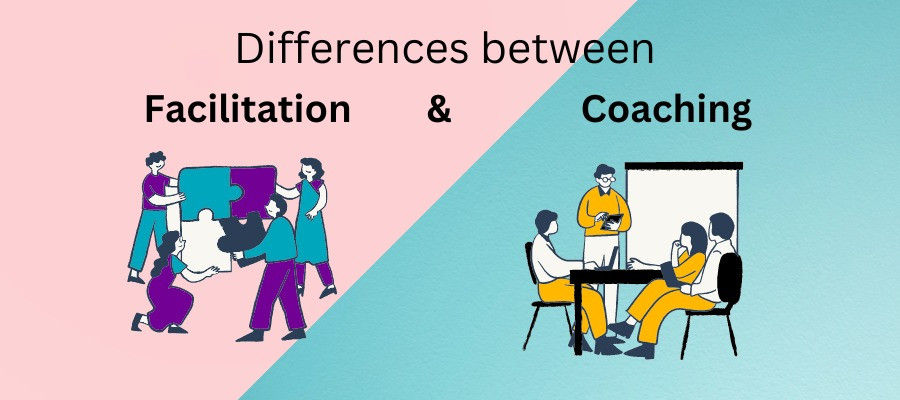Differences In Facilitation & Coaching

Agile Practitioners often use the words “coaching” and “facilitating” informally. While some Agilists say they are being coached, the person managing the agenda of an ongoing meeting becomes the facilitator. So, the two words have different meanings and purposes. However, many Agile Beginners do not know the exact difference. They don’t know when they should seek out Facilitation or Coaching. This guide will help today’s Agile Practitioners clarify “Facilitation” and “Coaching.”
Let’s Understand Facilitation:
Facilitation in Agile Scrum involves leading effective communication, decision-making, and problem-solving within teams and stakeholders. A facilitator acts as a neutral party who helps to create a supportive and inclusive environment where all voices are heard and valued.
Key Characteristics of Facilitation:
- Neutral Stance: Facilitators remain impartial and unbiased, ensuring that all team members can participate and contribute equally.
- Process-oriented: Facilitation focuses on the structure and flow of meetings and workshops, ensuring that agenda are followed, objectives are met, and outcomes are achieved.
- Active Listening: Facilitators actively listen to participants, clarifying perspectives, summarizing discussions, and encouraging more profound exploration of ideas and insights.
- Conflict Resolution: Facilitators address conflicts and disagreements constructively, facilitating open dialogue and guiding the team toward consensus and resolution.
When Facilitation Is Best Used:
Facilitation is perfect for teams that need an environment for efficient collaboration so that the team members can build consensus and diffuse internal conflicts. It creates a safe space for the team to flourish, with the facilitator holding an impartial stance and enabling participants to achieve their goals. Facilitation is generally a short-term engagement occurring during a meeting or series of meetings.
Let’s Understand Agile Coaching That Empowers Growth
Coaching involves guiding individuals and teams toward realizing their full potential, achieving their goals, and embracing Agile principles and practices. An Agile Coach is a supportive mentor who helps individuals identify their strengths, overcome challenges, and develop skills and competencies.
Key Characteristics Of Coaching:
- Empowerment: Coaches empower individuals to take ownership of their development and performance, fostering a culture of self-awareness, accountability, and continuous improvement.
- Questioning: Coaches ask powerful questions that stimulate reflection, insight, and learning, encouraging individuals to explore their beliefs, assumptions, and motivations.
- Feedback: Coaches provide constructive feedback and encouragement, highlighting areas of improvement and celebrating achievements to inspire growth and confidence.
- Goal-setting: Coaches help individuals set SMART (Specific, Measurable, Achievable, Relevant, Time-bound) goals and action plans, guiding them toward tangible outcomes and results.
When Coaching Is Best Used:
Coaching is best used when the person being coached (the coachee) wants to draw upon their own experiences and capabilities to set and reach their objectives. Coaching relationships are generally long-term and one-to-one, providing individuals with ongoing support and guidance to achieve their goals.
Introducing A-CSM Certification By Scrum Alliance For Advanced Development
Mastering facilitation and coaching skills is essential to excel as an Agile Leader or Coach. That's where the Advanced Certified ScrumMaster (A-CSM) certification by Scrum Alliance comes into play.
Why Apply For A-CSM?
- Enhanced Skills: Through A-CSM, you'll learn advanced techniques and strategies for facilitating dialogue, coaching individuals and teams, and scaling Agile beyond a single team.
- Global Recognition: Stand out in the worldwide marketplace as a highly trained Agile professional, distinguished by your A-CSM certification from the globally recognized Scrum Alliance community.
- Community Engagement: Join a vibrant community of Agile practitioners, coaches, and leaders, gaining access to valuable resources, networking opportunities, and ongoing support for your Agile journey.
- Personal Growth: Accelerate your personal and professional growth by gaining valuable insights, techniques, and tools from experienced Agile coaches and trainers like Suresh Konduru.
- Industry Relevance: Showcase your advanced skills and expertise to employers and peers, demonstrating your commitment to excellence and continuous learning in the Agile domain.
Venturing Into Facilitation & Coaching with PremierAgile Guidance:
While facilitation and coaching play vital roles in Agile product development, they serve distinct purposes and require unique skill sets. Facilitation fosters collaboration, dialogue, and decision-making within teams and stakeholders, while coaching aims to unlock potential, empower growth, and drive continuous improvement.
To master facilitation and coaching skills, you can take the A-CSM certification course led by Certified Scrum Trainers Suresh Konduru from PremierAgile. Being one of the most reputed Agile Coaches, he’ll help you make a meaningful impact as an Agile Practitioner in your organization. So, good luck!
Reference:
https://www.scrumalliance.org/get-certified/scrum-master-track/advanced-certified-scrummaster
https://www.linkedin.com/advice/0/what-some-differences-similarities-between-facilitation
https://www.scrum.org/resources/comparing-facilitation-coaching-mentoring-and-teaching



